The Hobbit: Kingdoms of Middle Earth Tips
The Hobbit: Lords of Middle Earth can be a fun game to play, but a lot of gamers have reported that they tend to get frustrated with the mechanics of what a Player vs Player game is all about. When there is no defense in a game that allows higher level players to bully lower level players, most gamers may well wish that Kabam! re-engineer their game so only players of equal ranking are able to fight against one another than overpower a lower-level player. But there are tactics if a gamer decides to study war strategy.
After more than month’s worth of play, the following pieces of advice should prove to be useful:
Alliance Tips:
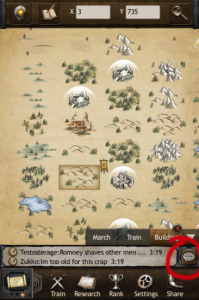
-
Before joining an alliance, players should look around the map to see who are the neighboring higher level cities. They can not attack if you belong to the same alliance they are.
- Alliances are much more stronger if they occupy the same area of the map. Not only does it make resource sharing go faster, but also in times of crisis, armies from different towns can organize a huge attack to occur at the same time.
- Although sending a mass mail works to request resources, there is no telling when a player will receive the goods since there is no estimated time of arrival. A better way is through the real time alliance chat window which some teams forget to use. Players can find it by clicking on the chat icon located to the right side of the screen (circled in red), and by clicking on the Alliance tab.
From this screen, there is a plus sign to make requests from. The game handles the details like figuring out where the trader is on the map than players forgetting to reveal their coordinates in a mass message. However, be aware: an unscrupulous player can make note of every location, quit the alliance and attack known hoarders.
- In this game, it is possible to join an alliance for nefarious reasons, like to learn coordinates, horde resources and then leave. Sadly, with this game, there is no honour amongst thieves.
Building Tips:
- It is easy to construct a building of any type of up to level 3 relatively fast, either with Mithril (when signing on to play this game for the first time) or by dedicating an hour to set up.
- There is no need to upgrade the Great Hall beyond level 4 at the start. It can be upgraded later when players feel comfortable in attacking.
- Players should spread the level up bonuses (i.e. The Train with Warriors, Archers or Gandalf combat item) to the additional heroes gained when the Great Hall is upgraded from level five on up. These heroes can then be put on permanent assignment, like to increase resource production when a character is buffed up.
- Players should get the farms up first, and they should begin with at least six buildings. Afterwards, more can be added as needed later to feed the troops, as the size of the army grows.
- To give construction time a boost, players should advance the research in ‘Engineering’ as soon as possible and from the Great Hall building, assign the highest level hero into aiding ‘Construction.’ After the building project is started, the hero can be released for other uses.
Gold and Resource Building Tips:

- In the Great Hall, players can dedicate a hero with an experience boost, like Train with Archers or Train with Gandalf, in order to boost production. This position is the only one worth keeping active at all times. If he’s needed for battle, then he can be taken out temporarily.
- Improve the vault to protect the resources first. Players should not produce more than what they can protect by keeping the capacity and protection limit nearly equal to each other.
- Gold cannot be protected. Players have the option to either send the extra gold and resources to a virtual bank, a city that some alliances offer to protect resources (it has a protection bubble always on), or to send them to another player to make use of.
On Training Troops and Maintaining Them
- Advanced players recommend building as many barracks as possible. Not only can more barracks speed training production, but also the size of the training queue is increased.
- It’s okay to have huge numbers of troops and not enough food to feed them. Once there, the troops are not going to leave. Building new troops, however, will be difficult. Instead of letting them rest, they should be used to fight goblin camps, other cities, or embark in Campaign mode to get other hidden treasures.
- A good way to boost food production is to own more grasslands or lakes than needed to give the food production a boost. When a player has enough forces to attack a higher level land resource, they should do so at the first opportunity. An advanced strategy is to build a second city (with a second city relic) and have that produce nothing but food, which gets shifted to the main city.
- True to this game’s nature, the goal is to steal resources from other players in order to create might through warrior training. That is, players should use all the resources stolen to build troops, perform city upgrades and add defenses sooner than later.
On Combat:
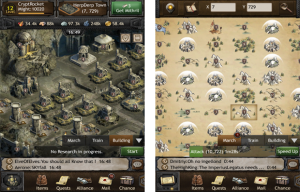
- There is a neat trick to pop those bubbles on cities that have just started. If a player has built a muster field, by ‘Marching Troops’ with the ‘March Type: Attack’ to the coordinates of a protected city, most of those hemispheres can be entered.
On Defensive Strategy & Looting:
- It’s almost pointless to build wall defenses. When an invading unit attacks and their numbers outnumber yours, all the defensive units disappears, and the attackers lose a number proportional to the defensive forces made. This formula makes this game weak, since nothing survives, including some gamer’s patience.
- Gold is plundered more often than other resources since it always grows. If players hate losing gold, then they should not even generate gold through city taxes. To turn off its grown, the option can be found in the Overview screen when the Keep is accessed. The Tax slider should be set to zero. In due time, since nothing can be gained, attackers may lose interest. But since other resources are continuously being generated too, a player may opt to destroy all their city’s resource generators and rely on getting what they need by conducting regular raids or through alliance requests.
On Land Use (Taming those Wilds):
- Taking over the wilds is a quick way to increase resource production. Fortunately, there is an unspoken rule of not ‘flipping the wilds.’ That is, some players will not attack a player-controlled wild out of respect. Other teams do not care and they will attack just to bring down the rate a city can product stone, food, gold, ore or wood. In real war, that’s what Sun Tzu would do first.









 Destiny: The Taken King How to Unlock the Nightstalker Subclass
Destiny: The Taken King How to Unlock the Nightstalker Subclass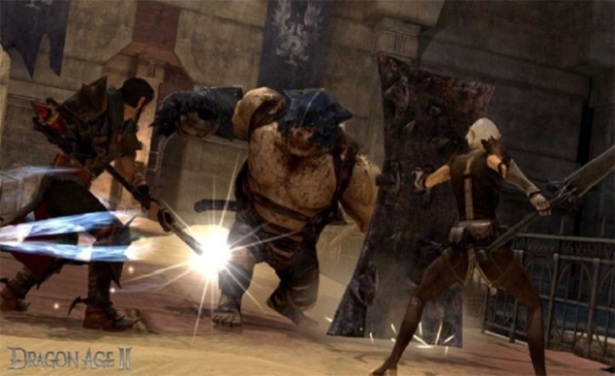 Dragon Age 2: Legacy DLC Walkthrough
Dragon Age 2: Legacy DLC Walkthrough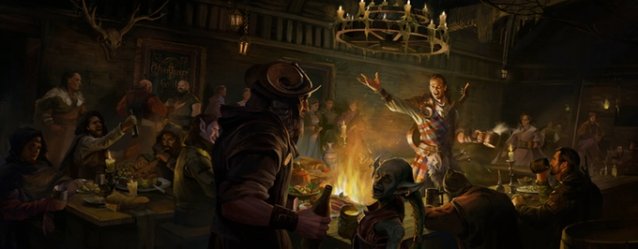 Brian Fargo Talks The Bards Tale IV and the Changing Landscape of Kickstarter
Brian Fargo Talks The Bards Tale IV and the Changing Landscape of Kickstarter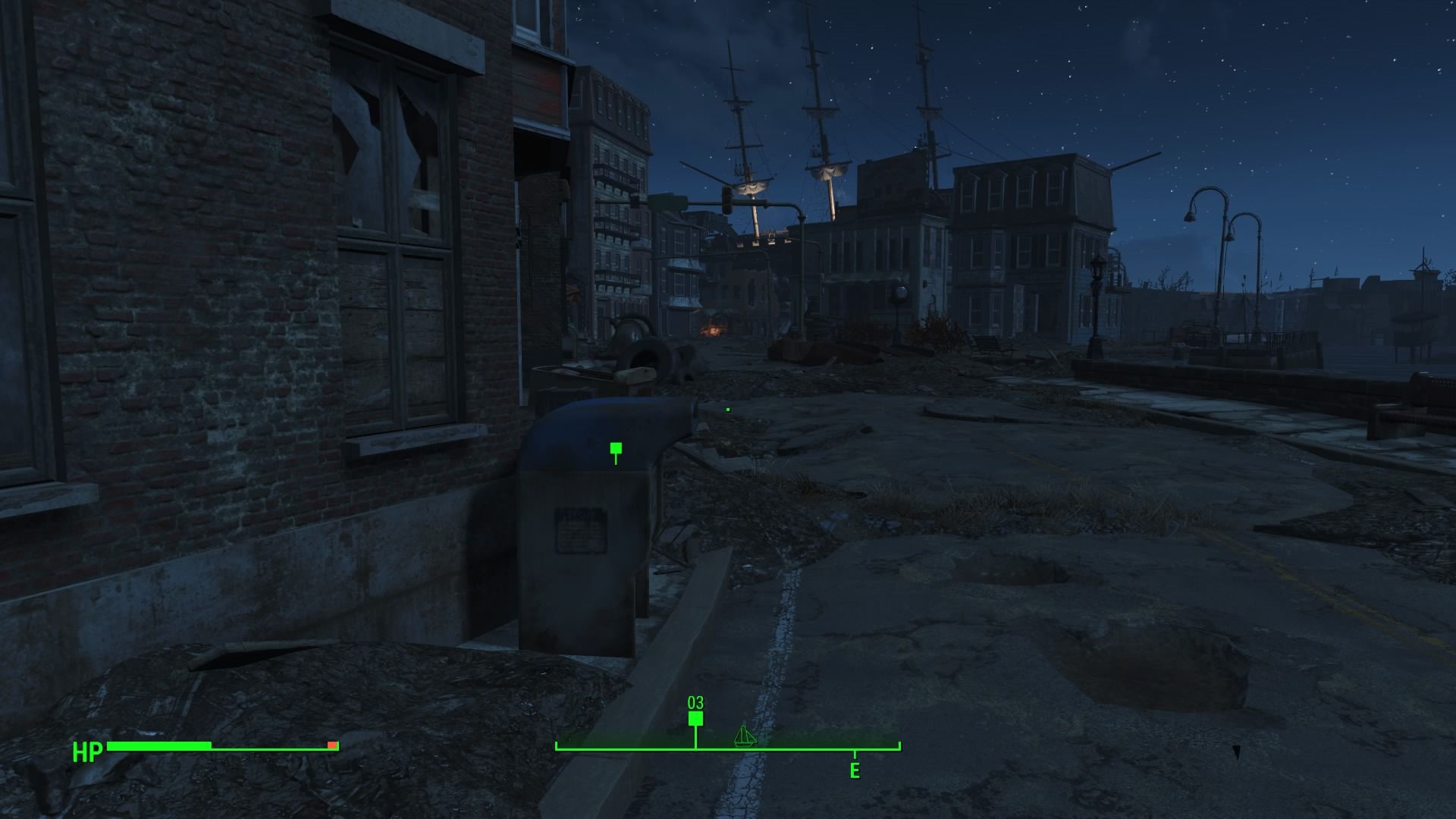 Fallout 4: Randolph Safehouse walkthrough
Fallout 4: Randolph Safehouse walkthrough Mortal Kombat X Guide: How to Play Sub-Zero
Mortal Kombat X Guide: How to Play Sub-Zero